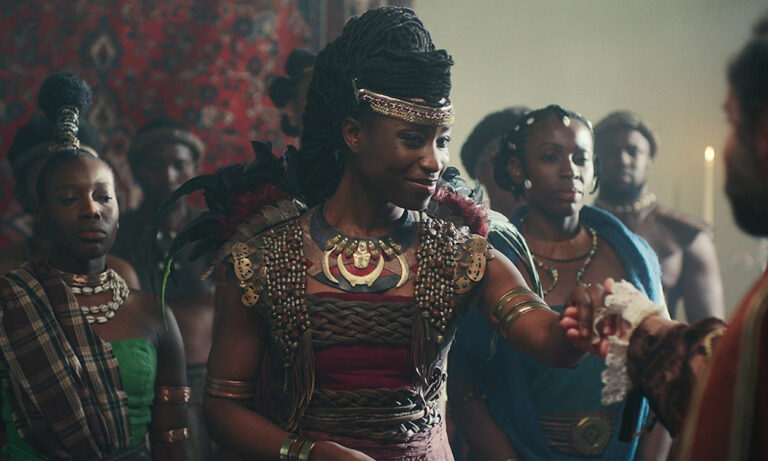Unpacking an important criticism of Jada Pinkett Smith’s African Queens: Njinga Netflix docuseries

There was a time when African cinematography that didn’t cast Black people solely as slaves felt like a farfetched dream for those of us who are diasporans. I’ve always desperately longed for my Angolan culture and history to be represented on mainstream screens. Still, I never considered the impact of the creators’ and writers’ gaze—especially when a win for the continent might not equate to a win for the country.
In February 2023, Netflix released part one of its newest docuseries African Queens: Njinga, produced and narrated by Jada Pinkett Smith. It promised to shed light on some of Africa’s greatest female monarchs, with the first four episodes tracing the rise, reign, family betrayal and political rivalries of Queen Njinga (commonly known as Nzinga), the 17th-century ruler of Ndongo and Matamba (in present-day Angola).
Speaking at the premiere held at the School of Oriental and African Studies (SOAS) in London, Pinkett Smith, joining in through a Zoom call, told the room that the inspiration behind the docuseries, which blends dramatisation and documentary, stemmed from a conversation with her daughter.
“At first, we thought, ‘Let’s go to Africa and study the queens of Africa together as mother and daughter.’ Because that terminology queen is tossed around a lot but what does it take to actually be a queen? So that’s where it really got inspired,” the actress and talk show host told the audience.
As one of the latest initiatives to highlight the lost stories of African female rulers, African Queens follows in the footsteps of The Woman King, a period action film which tells the story of the Agojie—a brigade of female warriors from present-day Benin, and Malika: Warrior Queen, an animated feature film based on Amina of Zaria, the mid 16th century Hausa warrior queen, by Nigerian-born, US-based animator Roye Okupe.
In 2022, after the Netflix docuseries had been announced months earlier, American Rapper 50 Cent also publicised that he was executively producing a scripted series titled Queen Nzinga for the American premium cable channel Starz. In his series, Nigerian-born actress Yetide Badaki has been cast as the Queen while in Pinkett-Smith’s, British-Nigerian actor Adesuwa Oni played Njinga.
In the early stages of making African Queens, Kenyan-born Peres Owino, one of the series’ writers, told SCREENSHOT that this African-American hunger for this kind of content is a great opportunity for filmmakers to use these stories as a bridge for diasporans.
“African-Americans were diasporans first, so Njinga’s story and her fighting against the slave trade, who do you think she was trying to save?” Owino posed. “And if we can use story to act together then we can get the wholeness the diaspora is seeking, we will find each other in our stories,” the writer added.
While the growing movement of breaking away from male-dominated narratives of the continent’s history of leaders is a win for Black African women, how much of a win is it for Angolans when Pinkett Smith’s series was filmed throughout South Africa and both protagonists are set to be non-natives?
“I’ve watched the Semba Comunicação’s movie Njinga: Queen of Angola [premiered in 2013], so I came with no expectations for Netflix’s Njinga,” said Manuel daCosta, 43, from Luanda, Angola.
“Despite the fact that the series had more of a historical evolution from the film, which I found profound, I didn’t understand why there was no use of the native tongue Kimbundu—a Bantu language that originated from Angola. In negating this, they dismissed the spirituality of the story,” Da Costa added.
On the other side of things, Kavulamine Arantes, a social activist from Angola, told SCREENSHOT that the lack of infrastructure in Angola could be one of the reasons why production didn’t film within the country. Arantes stated: “We [Angolans] are not prepared for big [production] things. Yes, we are growing and have very good actors but we lack support and initiative from those who regulate these matters. But we need to take ownership and matters into our own hands so we can tell our own stories.”
Shortly after the release of the series, BBC World News caught up with Owino and Oni, who played the Queen. In response to her Nigerian roots, Oni stated that she focused on the humanity of the person, rather than nationality when auditioning. “I was grateful to get the opportunity to tape for it and do a call-back, and when I was told I got the part what was important to me was to honour the person.”
The actress continued: “I’ve been given the opportunity to play Americans in my life, does that mean African-Americans will say I’ve got no right to play them? But it doesn’t mean I don’t understand that for some people it is important.”
Netflix’s African Queens: Njinga includes the input of credentialed experts and historians. One is Queen Diambi Kabatusuila, a real-life woman king of the Bakwa Luntu people, living in the present-day Democratic Republic of Congo. In response to whether Netflix attempted to tap into the Angolan dialect, Owino told the BBC’s Nyasha Michelle that including Queen Kabatusuila as the continuation of the lineage of Njinga showcases that history has never ended.
“Whenever you have black people doing a film about black people, especially in Africa, it’s about finding that thing that’s honourable. It’s done with respect because we know why we’re doing it. We’re doing it to show the world who we really are because so many narratives have gone out that have put us in a specific light,” Owino concluded.




